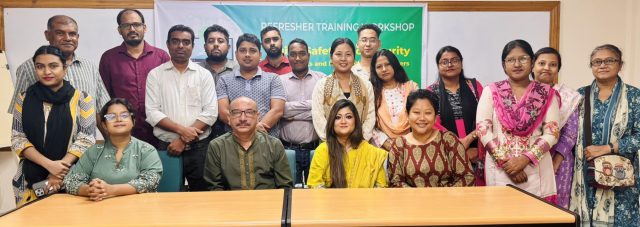 Digital security is no longer just a concern for technological expertise, it is now deeply linked with journalism and human rights. With this message in focus, a half-day refresher training workshop titled “Digital Safety and Security for Journalists and Human Rights Defenders” was held today at the NGO Forum for Public Health auditorium in Lalmatia, Dhaka. The workshop was organized by the rights-based advocacy organization, VOICE.
Digital security is no longer just a concern for technological expertise, it is now deeply linked with journalism and human rights. With this message in focus, a half-day refresher training workshop titled “Digital Safety and Security for Journalists and Human Rights Defenders” was held today at the NGO Forum for Public Health auditorium in Lalmatia, Dhaka. The workshop was organized by the rights-based advocacy organization, VOICE.Journalists working in various media, e.g., newspapers, television, and online media platforms, etc. as well as representatives from various human rights organizations who had participated in the earlier workshop, joined this session.
The digital security strategies were presented by Musharrat Mahera, Deputy Director of VOICE. She emphasized that, “For women journalists and human rights defenders, resisting digital threats and harassment is essential to safeguarding their security and protecting professional communications.”
Ahmed Swapan Mahmud, Executive Director, VOICE, stated that, “Incidents of surveillance, harassment, and repression targeting the media, whether by the state, corporations, or individuals, are steadily on the rise in the digital space. To ensure safety, we must urgently reassess and strengthen our digital security practices.”
The workshop further revisited hands-on sessions on threat modeling, artificial intelligence, strong passwords, two-factor authentication for critical social media accounts, VPN use, safe browsing with ToR, encrypted messaging, and data backup. Participants also practiced group exercises on identifying malicious links, maintaining digital hygiene and privacy on mobile phones and social media, avoiding public Wi-Fi, and disabling geo-location tracking to ensure digital safety while carrying out professional duties in the field. The workshop was facilitated by Ashraful Haque, a digital safety and security expert.
This workshop was designed to enhance the digital skills of journalists and human rights defenders.
